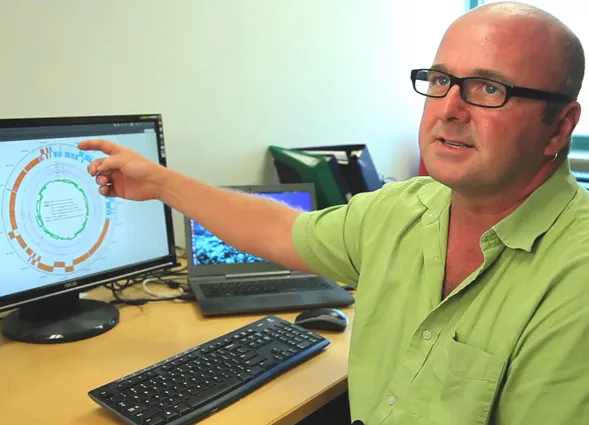As a group of researchers from San Diego State University has just made public in Nature Communications, half of the people house in our intestines the Crassphage virus, thus baptized in honor of the computer program that has found him.
This microorganism, which has 10 times more DNA bases than the AIDS virus, infects a very broad group of intestinal bacteria: bacteroides, which seem to play an important role in human obesity mechanisms.
The very interesting magazine tells that scientists expect the discovery of Crassphage not only to combat morbid overweight, but also serve to prevent or cure other disorders associated with the digestive system such as diabetes.
The fact that the DNA of the bacteriophage virus has been detected in the fecal samples of approximately 50 % of the individuals indicates that it is as old, at least, as Homo Sapiens himself.
It has also been proven that it does not appear in newborns, so it is probably acquired during childhood.
Expanded information
Crassphage, which infects one of the most common types of intestinal bacteria, bacteroid.This edge of bacteria is believed to be related to obesity, diabetes and other intestine related diseases.
Robert A. Edwards, Professor of Bioinformatics at SDSU, and his colleagues ran into the accident discovery.When they worked with the visiting researcher, and corresponding author of the study, Bas E. Dutilh, now at the Radboud Medical Center University in the Netherlands, researchers used the results of previous virus studies that inhabit the intestine to detect new viruses.
In the stool DNA samples of 12 different individuals, they noticed a private viral DNA group in the samples, of a length of around 97,000 base pairs.When Edwards and his colleagues checked if they were on a complete list of known viruses, they found nothing.
The researchers then examined the database of the Human Microbiando Project (HMP) of the National Institute of Health (NIH), and the MG-Rast database of the Argonne National Laboratory, and again found the DNA in abundance in the samples derived from feceshuman
To show that the viral DNA they discovered in their computer data actually exists in nature, the SDSU virologist, John Mokili, used a technique known as DNA amplification to locate the virus in the original samples used to build the databaseof the NIH.
It was a new virus present in approximately half of the samples of the people included, and that until then nobody knew.
"It is not unusual to go in search of a new virus and find it," Edwards said.“But it is very rare to find one that many people have in common.The fact that it has flown under the radar for so long is very strange. ”
an old virus
The fact that it is so generalized indicates that it is likely not to be a particularly young virus.
"We have basically found it in all the populations we have seen," said Edwards."So we can say that it is as old as the human being."
Edwards and his team appointed him Crassphage, after the computer program used to discover it.
Some of the proteins in Crassphage DNA are similar to those found in other well described viruses.That allowed the Edwards team to determine that the new virus is of the type known as bacteriophage, which infects and replicates inside bacteria.
Through innovative bioinformatics techniques they predicted that this particular bacteriophageBacteria of the intestine known as bacteriodetes.
Bacteriodetes bacteria live near the end of the intestinal tract, and it is suspected that they play an important role in the link between the bacteria of the intestine and obesity.The role that Crassphage plays in this process will be the objective of future research.
Once the virus is isolated, it is expected to deepen its role in obesity.It is possible that the virus somehow medium the activity of bacteriodetes colonies, but it is still about to be seen if Crassphage promotes or suppresses processes related to obesity in the intestine.
The virus can also be used to prevent or mitigate other diseases affected by the intestine, such as diabetes and gastrointestinal diseases.
Scientific article: Bas E. Dutilh, Noriko Cassman, Katelyn McNair, Savannah E. Sanchez, Genivaldo G. Z. Silva, Lance Boling, Jeremy J. Barr, Daan R. Speth, Victor Seguritan, Ramy K. Aziz, Ben Felt, Elizabeth A.Dnsdale, John L. Mokili, Robert A. Edwards.A Highly abundant BacterioPhage discovered in the unknown sequences of Human Faecal Metagenomes.Nature Communications 5, Article Number: 4498, DOI: 10.1038/NCOMMS5498
Source: San Diego University



